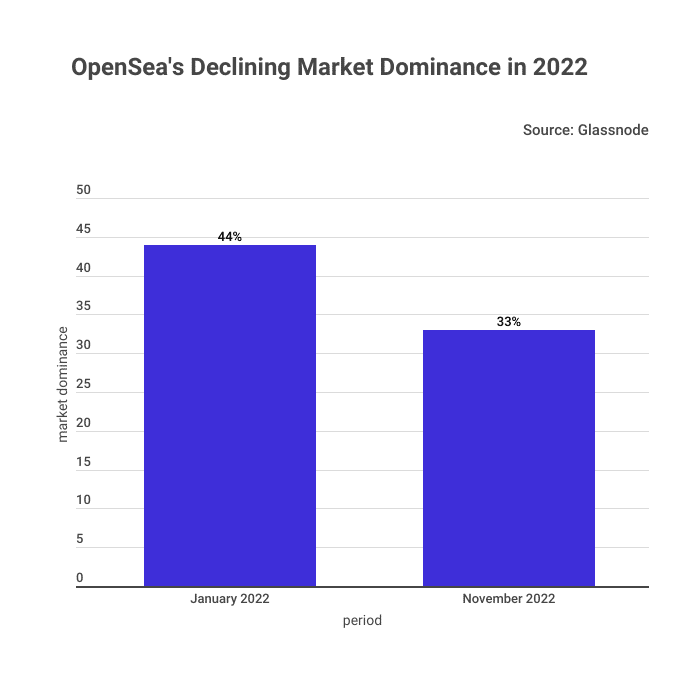OpenSea’s stranglehold on the global non-fungible token (NFT) market continued faltering in 2022. According to a recent BitcoinCasinos.com report, the marketplace’s dominance shrunk by 25% in the year. This decline saw its market share drop to 33% and marked a pivotal moment for the future of NFTs.
The platform has been the go-to NFT marketplace for many, but its domination is under increased pressure. According to Edith Reads, a BitcoinCasinos investments expert and long-time industry analyst, OpenSea’s hold is beginning to weaken. She explained:
“OpenSea was an innovator in the trading NFT space, and its success helped bring attention to the entire industry. However, it is becoming increasingly clear that its grip on the market is slipping as more competitors rise.”
A declining NFT transfer count has further compounded OpenSea’s woes. The site registered a 25% decline in the metric, falling from nearly 80K at the year’s start to roughly 60K by 31st December.
2022 Was a Tumultuous One for the NFT Space
Besides the growing competition, several factors have contributed to OpenSea’s declining fortunes.
First, the entire NFT space had a tumultuous year in 2022 characterized by an “NFT winter” akin to the one that ravaged the crypto sector then. A CoinGecko Q3 2022 Cryptocurrency Report observed that the NFT trading volume on the five leading marketplaces had slumped by 77%, dipping from a Q1 high of $13B to Q3 low of $2.1B. That significantly affected OpenSea’s performance.
New platforms have also been chipping on OpenSea’s market share through innovations and incentives. These projects incentivize user activity with tokens and thus have become more attractive to first-time adopters. Recently, OpenSea drew a backlash for opting for an IPO rather than rewarding its users with a token.
But in contrast, its competitors have established their presence across alternative blockchains like Solana and Polygon, with thriving NFT activity. This has compelled the latter to pursue a footing on those blockchains too.
What Next for Opensea?
The effect of this decrease in OpenSea’s market share is two-fold. On the one hand, it gives other platforms a chance to compete on a near-level playing field; on the other hand, it opens up more opportunities for users to find what they need easily and conveniently.
While OpenSea remains the biggest player in the space, smaller projects can finally have a fighting chance if they offer better services than it does.
It’s worth noting that the faltering dominance isn’t necessarily bad news for OpenSea itself. Rather than relying solely on its dominating position in the NFT market, it can focus on improving its overall service offering. This includes ramping up user experience improvements and introducing innovative features which can help ensure the platform remains competitive.

